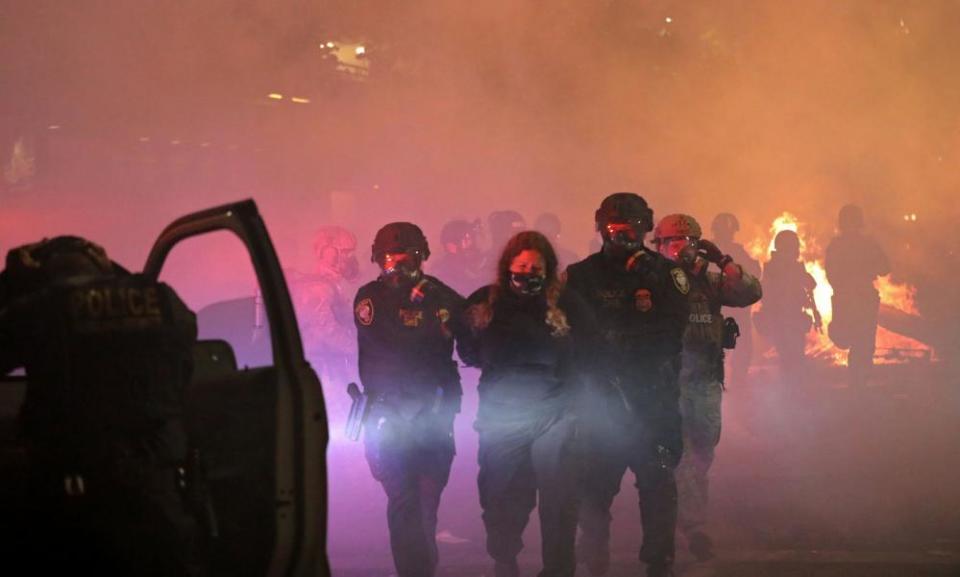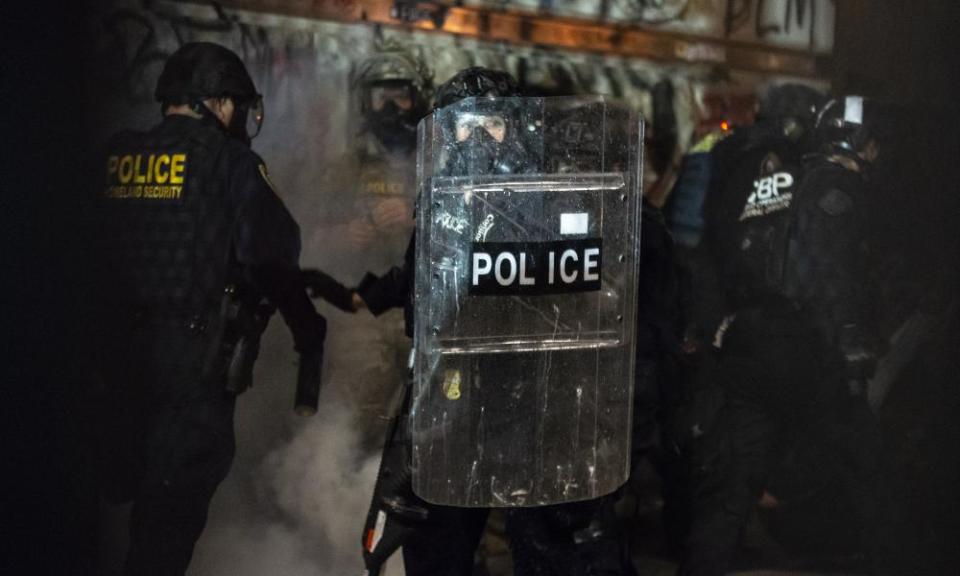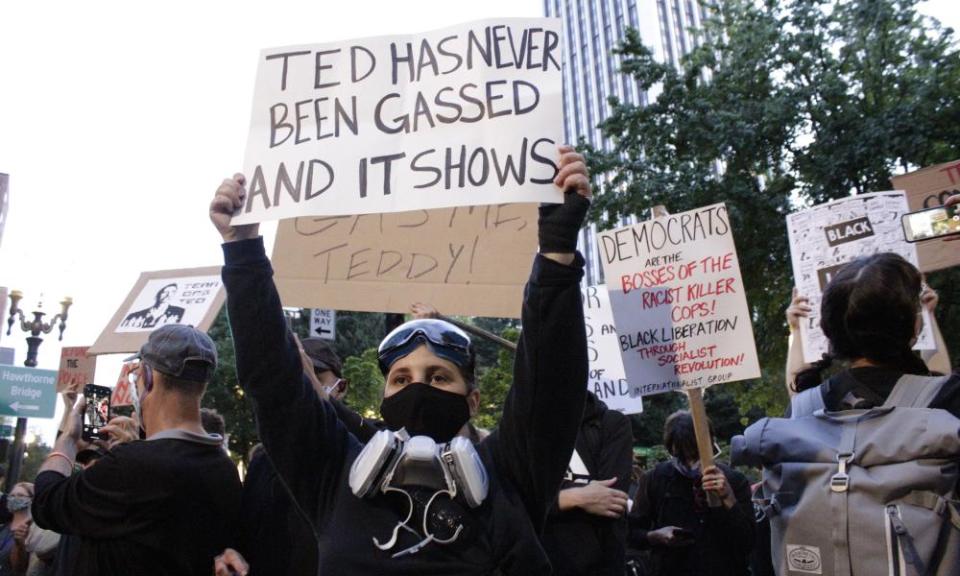'White as hell': Portland protesters face off with Trump but are they eclipsing Black Lives Matter?
Teal Lindseth surveyed the sea of mothers she was about to lead into the firing line.
“I look at this crowd and I don’t see many black people,” lamented the 21-year-old African American activist. “Oregon is white as hell. Whitewashed.”
Related: 'That’s an illegal order': veterans challenge Trump's officers in Portland
Lindseth has been a stalwart of the Black Lives Matter protests that have continued for nearly 60 days without interruption in a city that was derided as “Little Beirut” over the intensity of its demonstrations against a visit by George HW Bush four decades ago.
Portland has cemented that reputation in the Trump era, as the protests evolved into nightly showdowns with federal paramilitaries sent by the president to end what he described as anarchy.
But Portland has another reputation alongside its radical image. That of the whitest large city in America in a state with a constitution that once barred African Americans from living there. An 1850s law required black people to be “lashed” once a year to encourage them to leave Oregon, and members of the Ku Klux Klan largely controlled Portland city council between the world wars. Housing was effectively segregated in large parts of the city.
Many of today’s protesters say their support for racial justice in a city where the police department has a history of disproportionately killing African Americans is driven at least in part by an attempt to atone for Oregon’s racist past. But as Portland’s battles play out on the national stage, and Donald Trump stokes unrest for political advantage, some black leaders are asking whose interests the televised nightly confrontations really serve – and whether they are a continuation of white domination at the expense of black interests.
The children of the privileged are dancing on the stages of those that gave their lives for this movement
ED Mondainé, NAACP
The president of the Portland branch of the National Association for the Advancement of Colored People (NAACP), ED Mondainé, warned that the Black Lives Matter movement in the city is being coopted by “privileged white people” with other agendas. He said the confrontations with the federal officers sent by the president are little more than a “spectacle and a distraction that do nothing for the cause of black equality”.
Mondainé accused groups of young white people at the forefront of confronting federal officers of rising to Trump’s bait and using the campaign against racial injustice to provoke a fight in pursuit of other causes, such as anti-capitalism.

“The children of the privileged are dancing on the stages of those that gave their lives for this movement,” he told the Guardian.
Trump’s dispatch of a Department of Homeland Security (DHS) taskforce reinvigorated the protests in Portland as federal agents in camouflage snatched protesters off the streets in unmarked vans and severely beat others.
Outrage in the city, and nationally, at what smacked of police state tactics only fuelled the demonstrations, which did not displease the president. Trump presented the pictures of protesters in helmets and gas masks confronting federal agents as evidence of a city overrun by anarchists and antifa, and the Democrats as either helpless or complicit in the chaos.
Trump raised the ante by vowing to send a “surge” of federal forces to other Democratic-run cities such as Chicago, ostensibly to quell gun killings. He said Operation Legend, named after a four year-old boy shot dead in Kansas City, would see thousands of agents from the FBI, US Marshals Service and other agencies deployed to end a “rampage of violence”.
The mayors of Chicago, Los Angeles, Atlanta and 11 other cities wrote to the administration on Tuesday, accusing the president of an abuse of power and alleging that “federal law enforcement is being deployed for political purposes” amid suspicions that Trump is more interested in creating conflict than ending it in the run-up to the election.
“Unilaterally deploying these paramilitary-type forces into our cities is wholly inconsistent with our system of democracy and our most basic values,” they wrote.
The mayors also said they were disturbed at the actions of federal agents in Portland, calling their failure to wear proper identification and the snatching of protesters off the streets “chilling”.
“These are tactics we expect from an authoritarian regime – not our democracy,” the letter said.
Mondainé, who led a rally on Thursday evening to “bring back the focus” on to Black Lives Matter, said “empty battles” were serving Trump’s agenda because the president creates political theatre for electoral advantage. He said Trump is baiting protesters in Portland to light the fuse on a racist backlash across the country before the presidential election.
“We have to change that narrative. We cannot let teargas and rubber bullets define the moment that we’re in now. We must seize the moment and assure the world that this time racism will no longer live,” he said.
A dark stain
Mondainé and other black leaders want to shift the focus of protests in Portland back to one of the enduring legacies of Oregon’s racist past – reform of a police department with a long history of violence against the supposedly liberal city’s relatively small black population, and which has seen a sharp rise in the killing of African American men since Trump came to power.
African Americans make up just 6% of Portland’s 650,000 residents but accounted for 30% of shootings by police over the past three years. Black people were also several times more times likely to be arrested or stopped. The police department has proved so trigger happy that the Obama administration placed it under federal court oversight, although it sidestepped the issue of race in doing so.
But African Americans in Portland remain sceptical that the city or the police department are committed to change, particularly when officers are accused of siding with far-right groups such as the Proud Boys who regularly use the city as a platform for protests knowing it will create a backlash.

Accusations that the force tolerates neo-fascist sympathies are not new. Critics regard the case of Mark Kruger as a particularly dark stain on the police department and city government.
In about 2000, the then Portland police sergeant built a shrine in a public park to five Nazi soldiers including a member of Hitler’s SS and a war criminal. Kruger nailed plaques with their names to what he called an “Ehrenbaum” or honour tree. They were positioned so he could see them from the road when driving to work as a police officer, and he kept them polished.
The shrine remained in the park for several years until Kruger removed it when he was the target of federal lawsuits for use of excessive force against anti-Iraq war protestors. Portland attorney’s office stored the plaques until they were discovered years later by an internal affairs investigator.
That led to an investigation which concluded Kruger brought “discredit and disgrace” upon Portland police and the city. But he kept his job after a brief unpaid suspension for illegally posting the plaques on public property, and was later promoted to captain and head of the vice squad.
Trump ripped the band aid off of the racism that was bubbling under the surface of the country for a very long time
Dan Handelman, Portland Copwatch
Kruger admitted wearing Nazi uniforms but said it was because of his interest in history. He said the plaques were to honour the Germans’ military prowess not their crimes against humanity.
“Many military historians have erected similar remembrances all over the world,” he claimed at the time.
He remained a captain in the police department until his recent retirement.
People pressing for police reform saw Kruger’s continued employment and promotion as a reflection of the values of a police department with a reputation for brutality. The Obama justice department finally intervened over the level of police shootings in Portland, prompted by the case of Aaron Campbell in 2010.
The young black man’s brother had died earlier in the day. Campbell’s family feared he might be suicidal and called the police. The officers who went to check on him quickly established that he was not a threat to himself or anyone else, and even exchanged a lighthearted text message that put everyone at ease. But a second police unit arrived as Campbell emerged from a building. They shot him with a bean bag.
When he instinctively reached for where he had been hit, officers said he was going for a gun and shot him dead. Campbell was unarmed.
The civil rights leader Jesse Jackson called Campbell’s killing “an execution”. A Portland grand jury said the officer who shot him acted within the law but that did not mean he was innocent.
“This was very difficult for us as a grand jury, as our sympathies lie with the Campbell family and the mood of the community. As a group, we are outraged at what happened,” the grand jury said in a letter to the district attorney. The city paid Campbell’s family $1.2m.
The Obama administration demanded reforms and placed the police department under federal court oversight in 2014. But in a move some critics suspected was to save Portland’s Democratic leadership from embarrassment, the justice department said Campbell had been shot because the police had a pattern of using excessive force against people with mental health problems, not because he was black. Campbell’s family disagreed.
‘An often tense relationship’
A justice department report found “a pattern of dangerous uses of force against persons who posed little or no threat” but who had mental illness. These include the case of a 42-year-old local musician with schizophrenia, James Chasse, who was shot multiple times with a taser and beaten so badly by the police he had a punctured lung, 16 fractured ribs and 26 broken bones in all. He died in custody.
In another case, Portland police repeatedly tasered a naked and unarmed man who was acting oddly because he was suffering a diabetic emergency.
Although the justice department sidestepped a full investigation of racism by the Portland police, it did note “the often tense relationship” between the force and the African American community. It said there was a widespread perception among black people of racial profiling and that the police “protect the white folk and police the black folk”.
Dan Handelman of Portland Copwatch, which monitors police killings, said eight years of justice department oversight has not fundamentally changed how the Portland police act because, while the agreement between the city and the federal government requires new policies and training, it does not measure whether they are successful.
“If the Portland police continue to use violence against the general public, they’re still in compliance with that agreement. Have some changes have been made? Yes. But does it did it get at the root problems and the issues that people were worried about the first place? Not at all,” he said.

Handelman said that if anything, the situation has worsened.
“We had not actually had a shooting death of an African American Portlander by the police between early 2010 and February of 2017, which is rather remarkable. A seven-year stretch with no black man being killed. Since then, there have been at least five shootings of African Americans, and four of them died,” he said.
“For me, part of that is the national situation that we’re in. That the election of President Trump kind of ripped the Band-Aid off of the racism that was bubbling under the surface of the country for a very long time.”
The police response to protests in Portland after the killing of George Floyd in Minneapolis in May reinforced the perception that the force was resistant to change and raised questions about accountability.
In recent days, Portland’s mayor, Ted Wheeler, has made a show on national television of denouncing Trump’s deployment of federal forces, accusing the president of conducting “urban warfare” in his city. But when Wheeler turned out to speak at a protest on Wednesday, he faced hostility from demonstrators who accused him of hypocrisy.
The mayor is also the city’s police commissioner. In May, Wheeler declared a state of emergency amid escalating protests over Floyd’s death which saw storefronts smashed and some looted. Critics accused the police of overreacting by being too quick to fire teargas to break up demonstrations until a federal judge barred its use except where the police declare a riot.
When Wheeler arrived at Wednesday’s demonstration, a protester emptied a bag of spent teargas canisters at his feet as others peppered him with questions and accusations about his oversight of the police. Later, the mayor faced a barrage of derision after he denounced federal agents for an unprovoked firing of teargas that left him gasping for breath.

Teressa Raiford, the African American founder of Don’t Shoot Portland, accused the mayor of using the presence of the federal agents as cover for his own failure to address police reform.
“Our leaders now say: ‘Donald Trump’s attacking you and we care about you’. But the people on the front line realise we were being attacked by them before Donald Trump started attacking us,” he said. “They’re trying to claim that they stand as allies with the protesters. It is political. What you’re seeing with the mayor being sprayed with teargas, that is political propaganda.”
Raiford said Portland’s political leadership did not care to substantially change the system of policing because much of the city was comfortable with policies that, as the justice department noted, protect whites and police blacks.
‘All these liberal cities have extreme inequality’
The failure of so many American cities run by Democrats to address reform of racially biased policing hangs over Democratic political leaderships that claim to support the Black Lives Matters campaign.
Hyung Nam, who has been closely observing police reform as a member of a city committee that advises on how the police budget is spent, said the lack of political will reflects economic realities.
“All these liberal cities have extreme inequality, economic inequality, and there’s a major racial dimension to that. As long as we have that kind of economic inequality we’re going to see some form of policing like this,” he said.
Inequality has grown enormously and the way we’re dealing with that is through tougher policing
Hyung Nam
Nam said there is a pattern of more prosperous whites gentrifying black Portland neighbourhoods and then demanding increased policing which often makes the remaining African American residents feel insecure.
“Just the other day when I was testifying at the city council, there were people from the Irvington neighbourhood complaining to the council about homeless people that were engaged in illicit activities and basically calling for the cops to do something, which means criminalise them and sweep them somewhere.
“This is what’s happening in all these Democratic liberal cities. Inequality has grown enormously and the way we’re dealing with that is through tougher policing.”
However, Nam thinks that the scale of popular protest over Floyd’s death may finally have pushed the administration to get serious about reform including “significant” cuts to the police budget for its paramilitary teams and enforcing proper civilian oversight.
For now though, attention in and on Portland remains focused on the nightly theatre outside the federal courthouse – and where Trump will target next.
